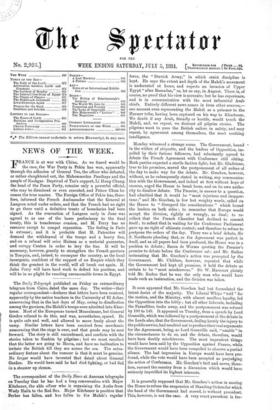Monday witnessed a strange scene. The Government, bound • in
the withes of etiquette, and the leaders of Opposition, im- pelled by their furious followers, had reluctantly agreed to debate the French Agreement with Conference still sitting. Both parties expected a sterile faction fight; but Mr. Gladstone, true to his promises, moved the postponement of all orders of the day to make way for the debate. Mr. Goschen, however, without, as be subsequently stated in writing, any communica- tion with the Government, and indeed at first without hope of success, urged the House to break loose, and on its own autho- rity to disallow debate. The Premier, in answer to a question, had admitted that it would be " most injurious and inoppor- tune ;" and Mr. Goschen, in few but weighty words, called on the House to " disregard the considerations " which bound the leaders on both sides ; to remember that Europe would accept the division, rightly or wrongly, as final ; to re- collect that the French Chamber had declined to commit itself ; to reflect that in waiting for the Conference -Parliament gave up no right of ultimate control; and therefore to refuse to postpone the orders of the day. There was a brief debate, Sir S. Northcote pleading that, as the Agreement was perfect in itself, and as all papers had been produced, the House was in a position to debate ; Baron de Worms quoting the Premier's promise to debate before the Conference sat ; and Mr. Raikes insinuating that Mr. Goschen's action was prompted by the Government.. Mr. Childers, however, repeated that while the Government had kept all promises, it held the debate as certain to be " most mischievous." Sir W. Harcourt plainly told Mr. Raikes that he was the only man who would have made such an insinuation, and the division was taken.










































 Previous page
Previous page